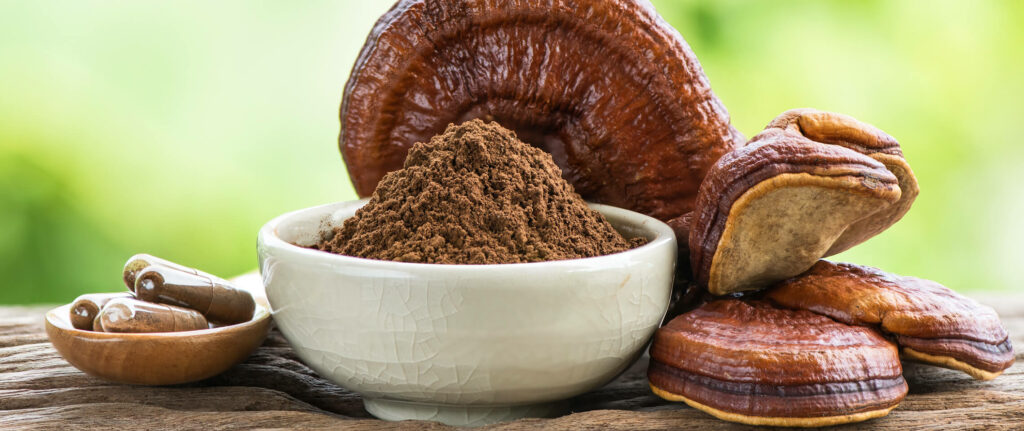Introduction
Mushrooms have long been revered for their potential health benefits, and among the vast array of fungi, the Reishi mushroom (Ganoderma lucidum) stands out as a potent source of holistic well-being. Revered in traditional Chinese medicine for centuries, Reishi is often referred to as the “mushroom of immortality” due to its purported health-promoting properties. In this comprehensive guide, we will delve into the diverse benefits of Reishi functional mushrooms, exploring the historical context, the array of bioactive compounds they contain, and the potential impact on various aspects of physical and mental health.
Historical Roots and Cultural Significance
Reishi mushrooms have deep roots in traditional Eastern medicine, particularly in Chinese and Japanese traditions. For over two millennia, these mushrooms have been revered for their believed ability to promote longevity, vitality, and spiritual well-being. The Chinese Ming and Qing dynasties even considered Reishi to be a symbol of good fortune and prosperity. Today, the global interest in Reishi has surged as modern science uncovers the bioactive compounds responsible for its reputed health benefits.
Bioactive Compounds in Reishi
The health-promoting properties of Reishi are attributed to its rich composition of bioactive compounds. These include
- Polysaccharides: Known for their immune-modulating effects, Reishi polysaccharides play a crucial role in supporting the body’s defense mechanisms.
- Triterpenes: These compounds contribute to Reishi’s anti-inflammatory and antioxidant properties. Triterpenes have been linked to potential benefits for cardiovascular health and liver function.
- Ganoderic Acids: With antihistamine and anti-allergenic properties, ganoderic acids found in Reishi may aid in managing respiratory conditions and allergies.
- Adenosine: Reishi contains adenosine, a nucleoside that can contribute to its calming effects, promoting relaxation and potentially aiding in sleep.
Immune System Support
One of the most researched and celebrated benefits of Reishi is its role in supporting the immune system. The polysaccharides present in Reishi mushrooms have been shown to enhance the activity of immune cells, including macrophages and T cells. By modulating immune responses, Reishi may help the body defend against infections, viruses, and other pathogens.
Adaptogenic Properties
Reishi is classified as an adaptogen, a term used to describe substances that help the body adapt to stress and maintain balance. The triterpenes in Reishi contribute to its adaptogenic properties by influencing the body’s stress response mechanisms. This adaptogenic quality may help individuals cope with physical, mental, and environmental stressors.
Anti-Inflammatory and Antioxidant Effects
The triterpenes and polysaccharides in Reishi mushrooms exhibit potent anti-inflammatory and antioxidant effects. Chronic inflammation is implicated in various health conditions, including cardiovascular disease and neurodegenerative disorders. By reducing inflammation and combating oxidative stress, Reishi may contribute to overall health and well-being.
Cardiovascular Health
Research suggests that Reishi mushrooms may have cardiovascular benefits. The triterpenes in Reishi may help lower blood pressure and improve blood circulation. Additionally, the cholesterol-lowering properties of Reishi may contribute to heart health by reducing the risk of atherosclerosis and related conditions.
Liver Support
Reishi has a long history of use in supporting liver health. The triterpenes in Reishi mushrooms have been studied for their potential to protect the liver from damage and enhance its detoxification functions. This makes Reishi a promising candidate for individuals concerned about liver health or those with liver conditions.
Respiratory Health
The anti-inflammatory and anti-allergenic properties of ganoderic acids in Reishi mushrooms may benefit respiratory health. Research suggests that Reishi extracts may help manage symptoms of asthma and other respiratory conditions by reducing inflammation and improving airway function.
Cognitive Function
Emerging research indicates that Reishi mushrooms may have neuroprotective effects, potentially supporting cognitive function and reducing the risk of neurodegenerative diseases. The antioxidant properties of Reishi contribute to its ability to combat oxidative stress in the brain.
Stress Reduction and Sleep Support
The calming effects of adenosine in Reishi mushrooms make them a potential ally in stress reduction and sleep support. By promoting relaxation and modulating stress hormones, Reishi may contribute to improved sleep quality and overall mental well-being.
Anticancer Properties
While more research is needed, some studies suggest that Reishi mushrooms may have anticancer properties. The immune-modulating effects, coupled with the potential to inhibit the growth of cancer cells, make Reishi a subject of interest in cancer research. However, it’s crucial to approach such findings with caution and await further clinical validation
How to Incorporate Reishi into Your Routine
Reishi mushrooms are available in various forms, making them versatile for incorporation into daily routines. Common forms include
- Supplements: Reishi supplements, available in capsule or powder form, offer a convenient way to ensure a consistent intake of this functional mushroom.
- Tea: Reishi tea is brewed by steeping dried Reishi slices in hot water. This method preserves many of the bioactive compounds and imparts a mild, earthy flavor.
- Tinctures: Reishi tinctures, typically alcohol extracts, provide a concentrated and easily absorbed form of Reishi. A few drops can be added to beverages or taken directly.
- Powdered Extracts: Reishi mushroom extracts in powdered form can be added to smoothies, soups, or other culinary creations.
Considerations and Precautions
While Reishi mushrooms are generally well-tolerated, individuals should exercise caution and consult with a healthcare professional, especially if:
- Taking Medications: Reishi may interact with certain medications, including blood thinners and anticoagulants.
- Undergoing Surgery: Due to potential effects on blood clotting, it’s advisable to discontinue Reishi use at least two weeks before scheduled surgery.
- Pregnant or Breastfeeding: Limited research exists on the safety of Reishi during pregnancy or breastfeeding, so it’s best to exercise caution and consult with a healthcare provider.
Conclusion: Harnessing the Potential of Reishi for Holistic Well-Being
In the realm of functional mushrooms, Reishi stands as a remarkable contributor to holistic health. Its rich history, coupled with the scientifically supported benefits, positions Reishi as a versatile ally in promoting immune function, reducing inflammation, and supporting various aspects of physical and mental well-being.
As with any supplement or natural remedy, it’s crucial to approach Reishi with an informed and balanced perspective. While research suggests numerous potential benefits, individual responses may vary. Incorporating Reishi into your routine, whether through supplements, teas, or culinary creations, provides an opportunity to unlock the wellness potential of this ancient mushroom in the modern context. As always, consult with a healthcare professional to ensure that Reishi aligns with your health goals and complements your overall well-being journey.

